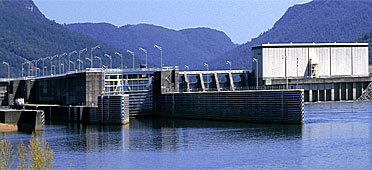Nickajack Reservoir

Nickajack Dam in southeast Tennessee was finished in 1967. It replaced the old Hales Bar Dam, built by private interests in 1913, which had leaks in its foundation.
Nickajack Reservoir extends 46 miles upstream from the dam to Chickamauga Dam. The reservoir offers wide expanses of water and the spectacular scenery of the Tennessee River Gorge, known as the Grand Canyon of Tennessee.
Boat-launching ramps and fishing berms are located on both sides of the river below the dam, and a concrete fishing pier with footbridges and a wheelchair ramp is available. TVA camping and picnicking facilities are also available.
Between late April and early October, nearby Nickajack Cave serves as habitat for roosting gray bats, an endangered species. At dusk, the sky is darkened as thousands of bats emerge from the mouth of the cave.
Nickajack is the sixth step in the stairway of TVA reservoirs and locks that carry barges up and down the Tennessee River. Some of the commodities passing through the Nickajack lock are grain, pulpwood, wood chips, soybean oil, salt, petroleum, steel products, and coal.